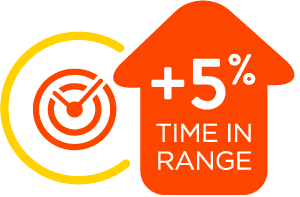Real-World Data
Analysing the impact of the FreeStyle Libre Portfolio on the lives of real users

Outcomes for people with diabetes
The FreeStyle Libre Portfolio is making a real impact on outcomes for people with diabetes.
Reduced hypoglycaemia1,2
Decreased HbA1c3
Increased time in range4
Improved quality of life6
Reduced hypoglycaemia
The FreeStyle Libre systems are clinically proven to significantly reduce hypoglycaemia in T1D1 and T2D2 patients
Decreased HbA1c
The FreeStyle Libre systems significantly reduce HbA1c for adults with diabetes in the UK
The ABCD Nationwide Audit3 explored the real-world experiences of Libre users in the UK and the impact on glycaemic control.
3,182
adults
with T1D or T2D
with 7.5 months followup
5.2
mmol/mol
average reduction in HbA1c
From baseline 67.5 mmol/mol HbA1c across the entire study population
12.3
mmol/mol
average reduction in HbA1c
for FreeStyle Libre users with a starting baseline of >69.5mmol/mol
Increased time in range
LibreLink app users experience better glycaemic control and more time in range4
1.2 hours
more time in range4
LibreLink◊ users spent 5% (1.2 hours) more Time In Range vs Reader users,4 which is clinically significant.5
 Real-world evidence comparing app vs reader (65.3% vs 60.5%, time in 3.9-10.0 mmol/L range, respectively)
Real-world evidence comparing app vs reader (65.3% vs 60.5%, time in 3.9-10.0 mmol/L range, respectively)
Improved quality of life
Use of the FreeStyle Libre systems is associated with improved quality of life in T1D and T2D6
66%
reduction in hospital admissions
in T1D and T2D6
from 13.7% to 4.7% at 12 months
A RWE study of the effect of the FreeStyle Libre 2 system on 1365 T1D and T2D patients on insulin over 1 year: endpoints included A1c, hypoglycaemia, and patient-reported outcomes.
(p=0.005)
33%
reduction in DKA
or hypo admissions
in T1D7
from 3.3% to 2.2% at 12 months
A RWE study of the effect of the FreeStyle Libre 2 system on 1913 T1D patients at 6 months and 1 year: endpoints included quality of life, number of hospital admissions, and hypoglycaemia.
(p=0.0031)
58%
reduction in work absenteeism
in T1D and T2D6
from 18.5% to 7.7% at 12 months
Real world data showed that work absenteeism in patients <65 years was decreased by 60% in patients using a FreeStyle Libre 2 system (from 20.4% to 8.3%; p<0.001).
A RWE study of the effect of the FreeStyle Libre 2 system on 1365 T1D and T2D patients on insulin over 1 year: endpoints included A1c, hypoglycaemia, and patient-reported outcomes.
(p=0.001)
Get started today
Learn more about the FreeStyle Libre Portfolio and its benefits for your patients with our FreeStyle Academy
Clinical Evidence
Clinical benefits for a broad range of T1D and T2D patients.
Training Resources
Explore our training resources to help you to help your patients understand Time in Range better.
Educational Modules
Learn more about Time in Range and the FreeStyle Libre 2 system through our Healthcare Professional education modules.
Webinars
We offer various on-demand webinars for Healthcare Professionals including Understanding Time in Range.
Webcast Series
Learn more about Time in Range in our CME accredited three-module webcast series.
References & Disclaimers
Images are for illustrative purposes only. Not real patient, data or healthcare professional.
◊ The FreeStyle LibreLink app is only compatible with certain mobile devices and operating systems. Please check the website for more information about device compatibility before using the app. Use of FreeStyle LibreLink may require registration with LibreView.
1. Bolinder J, Antuna R, Geelhoed-Duijvestijn P, Kr ger J, Weitgasser R. Novel glucose-sensing technology and hypoglycaemia in type 1 diabetes: a multicentre, non-masked, randomised controlled trial. Lancet. 2016;388(10057):2254-2263.
2. Haak T, Hanaire H, Ajjan R, Hermanns N, Riveline JP, Rayman G. Flash glucose-sensing technology as a replacement for blood glucose monitoring for the management of insulin-treated type 2 diabetes: a multicenter, open-label randomized controlled trial. Diabetes Ther. 2017;8(1): 55-73.
3. Deshmukh H, et al. Effect of Flash Glucose Monitoring on Glycemic Control, Hypoglycemia, Diabetes-Related Distress, and Resource Utilization in the Association of British Clinical Diabetologists (ABCD) Nationwide Audit. Diabetes Care 2020;43:2153–2160.
4. Kao K., Journal of Diabetes Science and Technology. (2021): https://doi.org/10.1177%2F19322968211044141.
5. Battelino T., Diabetes Care. (2019): https://doi.org/10.2337/dci19-0028
6. Fokkert M, van Dijk P, Edens M, et al. Improved well-being and decreased disease burden after 1-year use of flash glucose monitoring (FLARE-NL4). BMJ Open Diab Res Care. 2019. https://doi:10.1136/bmjdrc-2019-000809.
7. Charleer, S. Diabetes Care (2020): https://doi.org/10.2337/dc19-1610.
ADC-63839 v4.0


